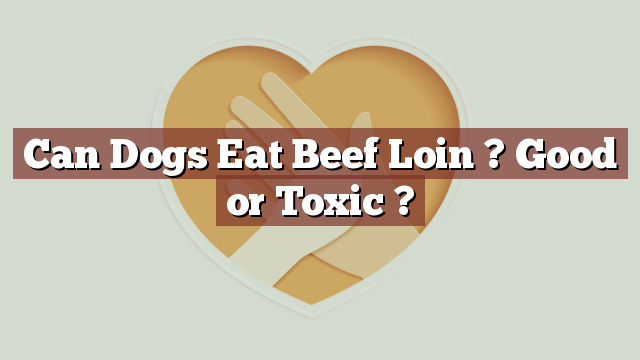Can Dogs Eat Beef Loin? Good or Toxic?
Knowing what foods are safe for our furry friends is crucial to their overall health and well-being. In this article, we will explore whether dogs can safely consume beef loin and the potential risks and benefits associated with it. It is important to note that while dogs are omnivorous, their dietary needs may differ from ours, and not all human foods are suitable for them.
Nutritional Value of Beef Loin for Dogs: Protein and Nutrients
Beef loin is a cut of meat that is often prized for its tenderness and flavor. It is a rich source of protein, essential for a dog’s growth, maintenance, and repair of body tissues. In addition to protein, beef loin contains vitamins such as B12, B6, and niacin, as well as minerals like zinc, iron, and selenium. These nutrients play a vital role in maintaining a dog’s overall health and vitality.
Is Beef Loin Safe for Dogs? Potential Toxicity and Risks
While beef loin can be a nutritious addition to a dog’s diet, it is essential to exercise caution. Raw or undercooked beef, including beef loin, can potentially harbor harmful bacteria such as Salmonella or E. coli that may cause foodborne illnesses in dogs. Additionally, the high-fat content present in beef loin can lead to pancreatitis, a condition characterized by inflammation of the pancreas. Pancreatitis can cause symptoms like vomiting, diarrhea, and abdominal pain.
In conclusion, it is not recommended to feed dogs raw or undercooked beef loin due to the potential risks associated with bacterial contamination and high-fat content.
Potential Risks and Benefits of Dogs Consuming Beef Loin
Feeding your dog cooked beef loin in moderation can have some potential benefits. The protein content of beef loin can contribute to the development and maintenance of strong muscles. The vitamins and minerals found in beef loin can also support a dog’s immune system, promote healthy skin and coat, and aid in proper digestion. However, it is crucial to ensure that the beef loin is free from any added seasonings or marinades, as these may contain ingredients that are toxic to dogs, such as onions or garlic.
On the flip side, overconsumption of beef loin can lead to weight gain and obesity in dogs. It is imperative to keep portion sizes appropriate and consider the overall calorie intake of your dog’s diet.
What to Do if Your Dog Eats Beef Loin: Tips and Recommendations
If your dog accidentally consumes raw or undercooked beef loin, it is essential to monitor them closely for any signs of foodborne illness. Symptoms may include vomiting, diarrhea, lethargy, or loss of appetite. If you notice any of these signs or have concerns about your dog’s health, it is advisable to consult your veterinarian promptly. They will be able to provide appropriate guidance and treatment if necessary.
Conclusion: Moderation and Monitoring Key for Canine Health
In conclusion, while cooked beef loin can be a beneficial addition to a dog’s diet, it should be given in moderation and with precautionary measures. Dogs should not consume raw or undercooked beef loin due to the potential risks of bacterial contamination. It is crucial to remember that every dog is unique, and it is always best to consult with a veterinarian to determine the most suitable diet for your furry friend. By practicing moderation and closely monitoring their health, we can ensure our dogs receive the nutrition they need while keeping them safe and healthy.
Thank you for investing your time in exploring [page_title] on Can-Eat.org. Our goal is to provide readers like you with thorough and reliable information about various dietary topics. Each article, including [page_title], stems from diligent research and a passion for understanding the nuances of our food choices. We believe that knowledge is a vital step towards making informed and healthy decisions. However, while "[page_title]" sheds light on its specific topic, it's crucial to remember that everyone's body reacts differently to foods and dietary changes. What might be beneficial for one person could have different effects on another. Before you consider integrating suggestions or insights from "[page_title]" into your diet, it's always wise to consult with a nutritionist or healthcare professional. Their specialized knowledge ensures that you're making choices best suited to your individual health needs. As you navigate [page_title], be mindful of potential allergies, intolerances, or unique dietary requirements you may have. No singular article can capture the vast diversity of human health, and individualized guidance is invaluable. The content provided in [page_title] serves as a general guide. It is not, by any means, a substitute for personalized medical or nutritional advice. Your health should always be the top priority, and professional guidance is the best path forward. In your journey towards a balanced and nutritious lifestyle, we hope that [page_title] serves as a helpful stepping stone. Remember, informed decisions lead to healthier outcomes. Thank you for trusting Can-Eat.org. Continue exploring, learning, and prioritizing your health. Cheers to a well-informed and healthier future!

